Veg News
Salvatore Genovese-grown hot chilli measures 1.4 million Scovilles and is available in Tesco stores until November
Tesco has launched what it claims is the “hottest-ever commercially-grown” chilli pepper into stores this week.
The Komodo Dragon chilli – which measures up to 1.4 million Scoville units – is grown for Tesco by the UK’s largest chilli grower, Salvatore Genovese, based in Blunham, Bedfordshire.
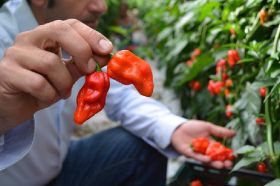
In comparison, a jalapeno pepper used in many pizza toppings measures 3,500 Scovilles, while the very hot Scotch Bonnet is rated up to 350,000 Scovilles, Tesco said.
Komodo Dragon chillis are now on sale in 500 stores in 15g packets sold for £1.
“In recent years we’ve had the fearsome Dorset Naga, the searing Bhut Jolokia and the mouth-numbing Trinidad Scorpion,” said Tesco chilli buyer, Eleanor Mansell. “But they all pale in comparison to the UK’s latest commercially-grown chilli pepper – the mighty Komodo Dragon which puts the others in the shade.”
Mansell said the Komodo Dragon is unusual because it has a delayed reaction that “lulls you into a sense of false security”.
“At first you can taste a wonderful hot fruitiness but then after about 10 seconds the full might of this little demon hits you and your whole mouth is aglow,” she said. “This is definitely a chilli pepper for connoisseurs and for those who are experienced in eating really, superhot food.”
Grower Genovese, who started growing chilli peppers about 15 years ago (after he took over his parents’ cucumber business), said hot chillis are the one that create the most interest. “So each year I try and grow one hotter than the last. I have chilli heads, as they’re known, contacting me from all over the world asking for samples,” he said.
“The Komodo Dragon should be livening up meal times over the coming months. I’d seriously advise anyone not experienced in eating really hot chilli peppers to have some milk or yoghurt ready as a standby to douse the flames.”
Genovese grows about one million chillis, or 15 tonnes, each week, on his seven-acre farm. Komodo Dragon chilli peppers will be available in Tesco until November.
Until this Thai-sourced product launched, shoppers could only buy mature brown coconuts in UK supermarket aisles
Asda has launched ‘young coconuts’ into stores nationwide, receiving backing from one of the stars of ITV’s The Only Way Is Essex (TOWIE) in the process.

Until now, shoppers could only buy mature brown coconuts in UK supermarket aisles, but Asda’s younger model is hot off the heels of the the thirst for coconut water drinks.
Dubbed ‘nature’s Lucozade’ the young coconuts can reportedly help you rehydrate post-workout due to their isotopic properties: a property that TOWIE’s Ferne McCann took to Twitter to eulogise about to her 606,000 followers.
Unlike some pre-packaged coconut waters, Asda’s young coconuts have no added sugar, no additives, and no preservatives or artificial colours, sweeteners or other added nasties.
Supplied from growers in Thailand, the outer green flesh of the young coconut shell is shaved down for easy handling, and all shoppers have to do is chop off the top at home and stick in a straw.
Young coconuts differ from the more mature, brown and hairy coconuts we’re used to seeing on shelves as the insides are made of coconut water and a jelly-like flesh – the older they get, the darker the outer shell becomes and the inside of the coconut turns to hard white flesh with no water at all.
Fresh produce manager at Asda, Charlie Mills, said: “As Brits become increasingly interested in natural, clean hydration with no added extras we felt we needed to go right to the source and give shoppers the purest from of coconut water we can.
“Bottled versions are great for people on the go, but if you’re after coconut water in its purest form then an Asda young coconut is the nuts.”
Group’s banana operations in Costa Rica have been awarded carbon neutrality certification by SCS
To coincide with Earth Day 2015, Del Monte Fresh Produce has concluded that its banana operations in Costa Rica have achieved carbon neutrality certification from SCS.

Del Monte has also confirmed its continued commitment to conservation through its reforestation/conservation programmes across all its farming operations worldwide.
Carbon neutrality certification covers the entire custody chain from Del Monte banana farms – consisting of 33 farms and 41 packing houses, totaling 10,653ha – up to the loading port in Costa Rica. Greenhouse gas emission audits were conducted by SCS Global Services and were based on the following four, widely accepted, standards:
• World Resources Institute’s Greenhouse Gas Protocol: A Corporate Accounting and Reporting Standard (Revised Edition)
• Corporate Value Chain (Scope 3) Accounting and Reporting Standard: Supplement to the GHG Protocol Corporate Accounting and Reporting Standard
• Draft Costa Rican Standard 2013 “Metodología para la Cuantificación y Verificación de Remociones Forestales – Borrador”
• SCS’ Carbon Neutrality Requirements (a proprietary standard by SCS Global Services), June 2014
“We are very excited that our banana operations in Costa Rica achieved carbon neutrality status and were certified under these very stringent standards,” said Hans Sauter, vice-president corporate research & development and agricultural services of Del Monte. “With these satisfying results, we are now looking into replicating this experience in other operations.
“This certification validates the effectiveness of our environmental sustainability efforts and it comes on the heels of our recent sustainably grown certification by SCS of our banana and pineapple operations both in Costa Rica and Guatemala,” he added.
As part of the company’s commitment to offset its carbon emissions, Del Monte Fresh Produce continues to invest significant resources in maintaining nature reserves as well as planting trees in its operations worldwide.
It is estimated that by the end of 2015, a total of 7,578ha will be under protected status or reforested. This is in addition to the thousands of trees, many of them local species, which are donated every year to the schools and employees in communities where Del Monte operates.
Cross between plum and mango launched in UK, with retailer predicting it will be a roaring success with its customers
M&S are launching an exclusive new variety of plum to the UK.
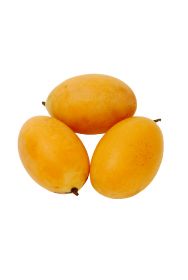
The bouea macrophylla, or mango plum as it’s known in English, is a plum that has been crossed with a mango, and has been dubbed the ‘plango’.
The fruit has a bright orange skin, which is firmer than that of a plum and a sweet taste similar to that of an Alphonso mango, but with a softer plum-like texture.
M&S fruit buyer Shazad Rehman, said: “We’re really excited to be introducing the first mango plum to the UK. We know our customers like to try new and interesting fruit, and we’re sure this will be something they will really enjoy.
“It has a soft texture and all the delicious flavour of a mango without any of the hassle to prepare as you can eat the skin.”
The plango is a tropical fruit grown on trees native to southeast Asia.
The M&S team have been working with their specialist growers in Thailand for several years to get it on shelves.
The fruit is much smaller than a traditional mango as it grows to just 5 cm in diameter and 10 cm in length.
Plangos are best enjoyed slightly chilled, and will be available in M&S stores across the country from this weekend (11/12 April) priced at £1 each.
Research conducted in US claims to show that switching to an organic diet could improve sperm quality and quantity
Pesticides on fruit and veg could be harming sperm counts, new research has suggested.
The team from Harvard University in the USA suggested that men should consider going organic if they want to have children, as, although their research wasn’t conclusive, they believe produce containing high levels of pesticides may be having a damaging impact on semen quality and quantity.
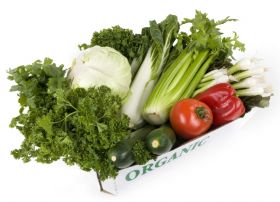
The study found that men who ate at least one and half portions of fruit and vegetables containing high levels of pesticide residue had sperm counts which were 49% lower than usual. Their semen quality was also reduced by 32%.
Those who ate large quantities of fruit and vegetables with little or no residue saw their sperm quality increase by 37%.
The researchers stated: “These findings should not discourage the consumption of fruit and vegetables in general. In fact, we found that total intake of fruit and vegetables was completely unrelated to semen quality.
The team analysed 338 semen samples from 155 men aged between 18 and 55 attending a fertility centre between 2007 and 2012.
The men’s diet was assessed by a questionnaire, and they were asked how often, on average, they had consumed how many portions of fruit and vegetables, using standard portion sizes such as one apple, or half an avocado.
The study took account of usual practice in food preparation, such as whether the fruit and vegetables had been peeled and washed.
The researchers divided the men into four groups, ranging from those who ate the greatest amount of fruit and vegetables high in pesticides residue (1.5 servings or more a day), to those who ate the least amount (less than half a serving a day).
They also looked at men who ate fruit and vegetables with low-to-moderate pesticide residues.
The group of men with the highest intake of pesticide-heavy fruit and vegetables had an average total sperm count of 86 million sperm per ejaculate compared to men eating the least, who had an average of 171 million sperm per ejaculate – a 49% reduction.
The research was published in the journal Human Reproduction.
Latest ONS shopping basket used to assess inflation in the UK economy includes maiden appearances for exotic produce
Sweet potatoes and melons have been added to the shopping basket used to measure UK inflation, with items such as sat navs and yoghurt drinks being removed to make room.
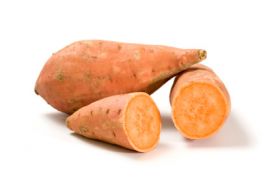
The Office for National Statistics (ONS) updates its basket of goods and services every year to keep pace with trends and changing spending habits, meaning joining the exotic fruit and vegetable on the list this year are e-cigarettes, headphones and music streaming subscriptions.
Other additions include chilled pizza, which replaces frozen pizza, as spending on chilled pizzas has risen above spending on the frozen alternative.
The inflation basket dates back almost 70 years, and now includes 703 goods and services.
Using the shopping basket, the ONS collects over 100,000 individual prices each month from 20,000 shops across the UK, as well as a further 70,000 prices online to assess how fast prices are rising and falling.
It then uses weights for each item – their relative importance in calculating inflation – based on survey evidence of people’s spending, and comes up with an inflation number for the whole economy.
The latest data showed inflation at a record low of 0.3% on the consumer price index measure.
First British strawberries are available a week earlier than usual, with growers on the outskirts of Cardiff one step ahead of the rest
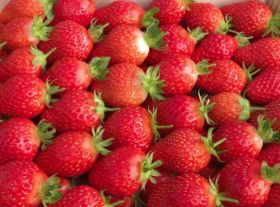
As a result of a generally mild winter; growers have produced the first British strawberries – a week earlier than usual.
These berries, on their way to retailers such as Tesco across the UK, also mark the first time ever that Wales has successfully produced the UK’s earliest strawberries, ahead of the likes of Kent, Sussex and Hampshire.
The variety of these early season Welsh-grown strawberries, grown in the Rhymney Valley, near Cardiff, is called ‘Driscoll’s Lusa’ and have been selected because of their consistent, sweet taste.
Proposed deal could create world’s largest fresh produce company and adds development to recent rumours of a possible sale
The directors of Belgium-based fruit and vegetable giant Univeg have revealed they are to discuss a potential merger with processing firm Greenyard Foods and horticultural substrate specialist Peatinvest, a move that would create the world’s largest fresh produce company.
Greenyard Foods, which changed its name in September 2013 from PinguinLutosa after the sale of its Lutosa potato business to McCains, is currently listed on the Euronext stock exchange, so the move will add further fuel to rumours circulating last month that plans are afoot to take Univeg public.

In February, Belgian newspaper De Standaard claimed that Univeg’s chairman and majority shareholder Hein Deprez wanted to sell the company in an initial public offering during the second half of 2015.
In a statement, the company’s board said it believed a “business combination” of the three groups had the potential to create “a unique global player in the fruit and vegetables market capable of offering the full range of fresh, frozen and canned products”.
Combining Univeg with Greenyard Foods and Peatinvest would in theory create a global market leader in the fruit and vegetable business, with combined revenue in excess of €3.7bn eclipsing the sales of even the largest multinationals currently operating in the business.
Hein Deprez, chairman of Univeg, is also chairman of Greenyard Foods and Peatinvest – both of which have their headquarters in Belgium.
At Greenyard, via Deprez Holding, Food Invest International and 2D, he is also the controlling shareholder of the company, with around 46 per cent ownership. He is also the major shareholder in Peatinvest.
Commenting on the proposed merger, Deprez commented: “Creating a combined group offering fresh, frozen and canned fruit and vegetables would be beneficial to growers, retailers, consumer, employees and shareholders. We believe societal trends call for a more holistic view on fruit and vegetable consumption.”
Univeg’s statement added that discussions were still due to take place regarding the value and specific detail of any such deal. No decision will be made until an agreement has been reached!
“No final decision has been reached regarding the structure of any business combination,” the group added. “In the meantime, there can be no certainty on any agreement between Univeg, Greenyard Foods or Peatinvest, or as to the terms of any such agreement.”
‘Potatokens’ on packs of branded All Rounder and Jacket Potatoes will be redeemed for potato preparation equipment
Potato supplier Greenvale is launching a loyalty campaign that allows shoppers to exchange ‘potatokens’ for potato preparation or kitchen equipment.
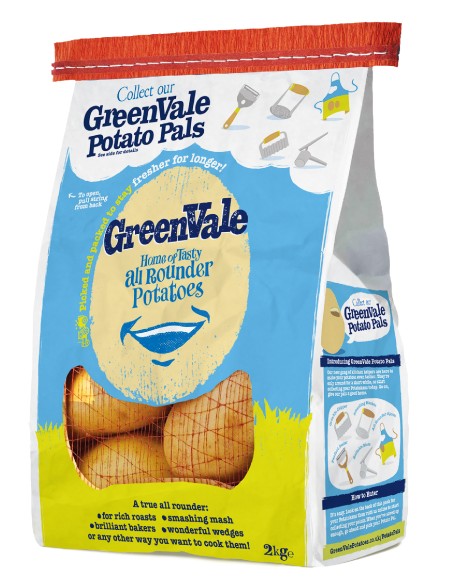
The ‘Potato Pal’ loyalty scheme, set to run at Tesco, Booths and Ocado, aims to boost sales of GreenVale All Rounder and Jacket Potatoes.
The on-pack tokens are in the form of unique codes and, once collected, must be registered on the company website, where accumulated points are redeemed for products including mashers, chippers, ricers and peelers.
Greenvale said it expects to reach more than 12 million shoppers, and will maintain belief and enthusiasm for the promotion by encouraging participants to post on social media, weekly prize draws, emails, recipes and ‘potato tips’.
Tracey Mattock, Greenvale’s marketing manager said direct communication with shoppers is a new venture for the business.
“We are extremely excited about the potential the Potato Pal scheme holds not only in terms of increasing awareness, trial and purchase of our branded potatoes, but also as an fun and attractive format to extend our social media presence.”
The scheme officially launches to consumers in the March edition of Tesco Magazine – where 10 starter points will encourage initial sign up – and will be promoted from 20 February.